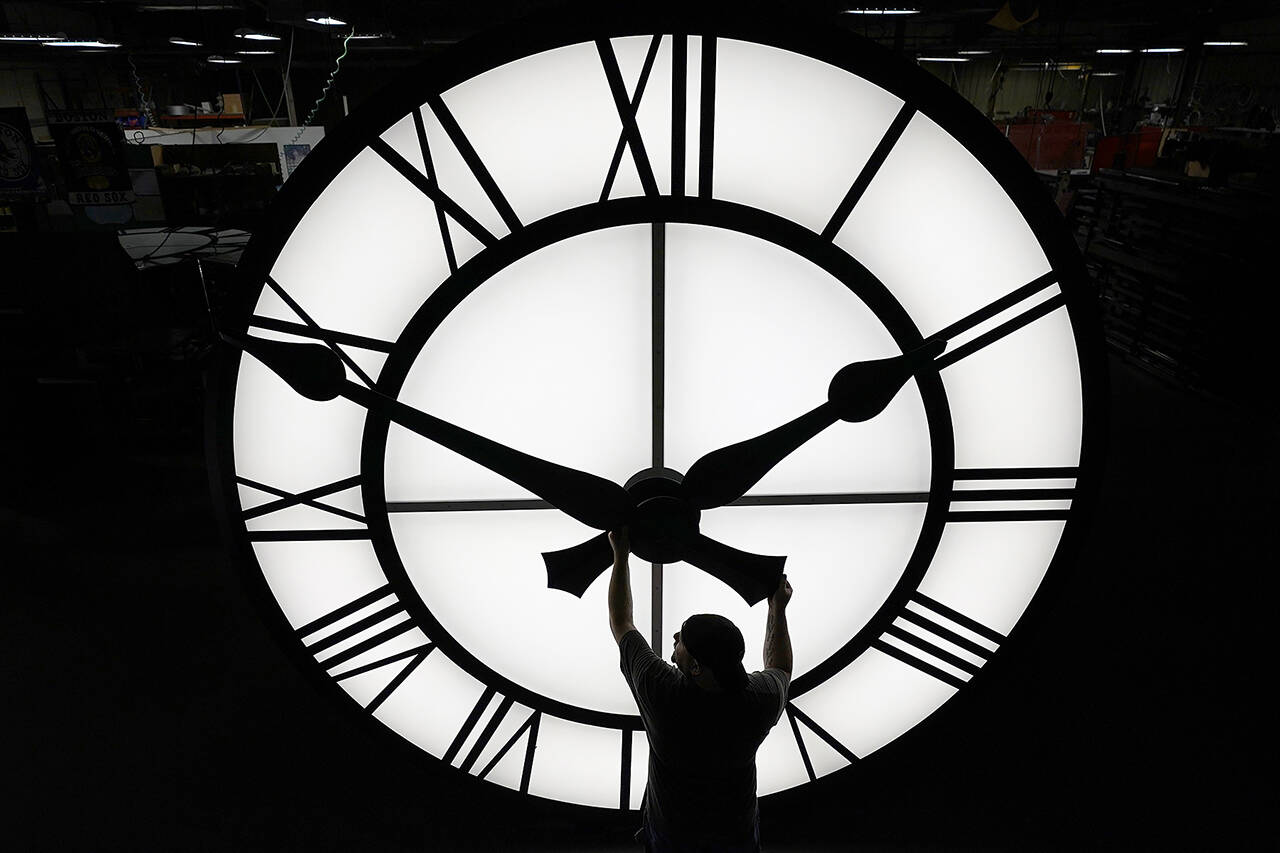By The Herald Editorial Board
Time’s a wastin’.
Yet, we keep wasting that time, waiting for Congress to end the twice-yearly to and fro between standard time and daylight saving time.
As recently as 2021, 19 states, including Washington state, had adopted legislation that sought a permanent switch to daylight saving time, preserving its shift to an hour less daylight in the morning and an hour more daylight later in the evening, which at the start of summer here means the sun doesn’t set until about 9:15 p.m., but in late October doesn’t bring sunrise until nearly 8 a.m., well after most kids are in school and many of us are at work.
The reason that lock on daylight saving time hasn’t happened is that it literally takes an act of Congress. And Congress hasn’t acted. Much.
The closest it came was in 2022, when the Senate passed the Sunshine Protection Act. The House, however, hit the snooze button; the legislation was “held at the desk,” meaning it was never referred to a committee nor received a hearing; let alone a vote.
There’s long been consensus that the twice-yearly time warp between the two times results in a number of poor outcomes for safety and health as our bodies and brains adjust. There’s even a name for it: “social jet lag.” We typically experience those jet-lag-like effects with different schedules between weekdays and weekend, but the effects are most pronounced during the twice-annual practice of gaining or losing an hour of our days. The health effects of social jet lag caused by disrupting the body’s circadian rhythm, studies have shown, include an increased risk of obesity, heart attacks, cardiovascular disease and depression, according to a 2020 paper in the Journal of Clinical Sleep Medicine.
Turning the clocks forward an hour from standard time to daylight saving time in late winter — often resulting in a loss of sleep and poor sleep quality for most people — has been found responsible for an increase in on-the-job and vehicle accidents, injuries and health problems, until our bodies adjust.
Rather than wait any longer for Congress to go with the switch to DST, two senators in the Washington state Legislature — Sens. Jeff Wilson, R-Longview, and Manka Dhingra, D-Redmond — are proposing that the state instead stick with standard time, joining Arizona and Hawaii, which already went with year-round standard time.
Unlike the switch to daylight saving time, making the commitment to standard’s standard doesn’t require Congress to act. It may however take some coordination, if not with all 50 states, at least those in the Pacific time zone.
The legislation, Senate Bill 5001, was among legislation filed this week ahead of the legislative session that begins Jan. 13.
While there’s little argument that the switch back and forth is a bad idea, there’s been less consensus on whether standard time or DST would provide more advantages.
Those urging the switch to daylight saving time have held that more light later in the day could cut down on vehicle crashes, noting that fatal vehicle-on-pedestrian accidents increase threefold after the sun goes down; while the same is true of standard time in the morning, a Rutgers study found that nearly 350 lives could be saved each year with year-round DST.
Proponents also have claimed that permanent DST would increase time for recreation and commerce, decrease crime and save energy, but more recent studies have alleged those effects may not be statistically significant.
More recently, however, medical studies have sided with standard time; which is more closely aligned to our internal clocks.
The American Association of Sleep Medicine cites research that shows standard time more closely matches our body’s circadian rhythms. When the body receives more light in the morning and darkness in the evening — better aligning our bodies to nature’s light schedule — it’s easier for us to fall asleep at night and wake in the morning.
In terms of traffic safety, the sleep medicine folks say, standard also is of more advantage in the morning, especially for those in the nation’s northern states — like Washington — which already experience fewer hours of daylight in the winter.
“Permanent” daylight saving time got a trial run during the 1973 oil embargo, when it was used as an energy-saving measure. During that winter, complaints about the extra hour of morning darkness and concerns for children on their way to school forced Congress to reconsider and end permanent DST in the fall of 1974, after only eight months.
Both the AASM and the American Medical Association have called for a permanent move to standard time.
Permanent standard time might even help our mood.
Beth Ann Malow, a professor of neurology and pediatrics at Vanderbilt University, wrote that more light in the morning can boost mood, as those who use light boxes in the morning to treat seasonal affected disorder can attest.
“Although the exact reasons why light activates us and benefits our mood are not yet known, this may be due to light’s effects on increasing levels of cortisol, a hormone that modulates the stress response or the effect of light on the amygdala, a part of the brain involved in emotions,” Malow wrote for The Conversation in 2023.
Conversely, more light later in the evening may also disrupt the body’s release of melatonin, the hormone that regulates the body clock and aids in sleep.
The debate between daylight saving time and standard time will continue, which is why the Legislature ought to give Wilson’s and Dhingra’s bill full consideration and opportunity for public comment and debate this coming session.
But it’s long past time we stopped losing sleep — literally — over an unnecessary time swap.
Talk to us
> Give us your news tips.
> Send us a letter to the editor.
> More Herald contact information.

























